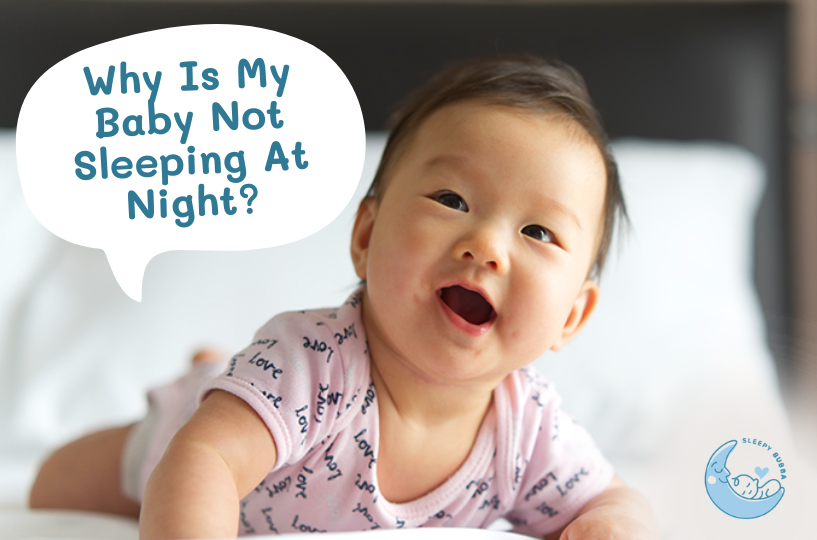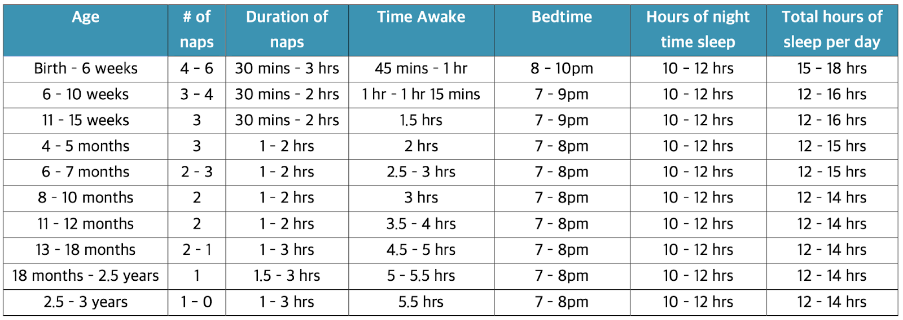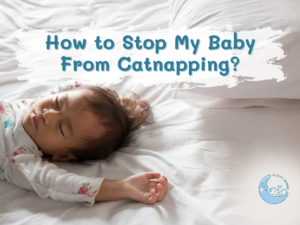Enquire Now with FREE 15 Mins Call
Why is My Baby Not Sleeping at Night?

Babies go through many changes in their sleeping patterns from the time they’re newborns to the time that they become toddlers. These changes can take on many different forms, such as extended wakefulness, skipping naps in the daytime, and waking up more often at night.
The opposite can also happen, whereby babies sleep more than usual. Sleep patterns can change drastically in a short amount of time.
If you notice your baby’s sleeping patterns changing and they’re no longer sleeping well at night, there are certain steps to take. We’re going to look more closely at the reasons why your baby is waking up more often at night, and what you can do.
The Role of Melatonin and Cortisol in Baby Sleep Patterns
Even as adults, our sleeping patterns are regulated by hormones. Babies too, are slowly developing more complex sleep patterns as they grow older. These patterns are also regulated by the same hormones that will continue all the way to their adulthood.
Two of the main hormones involved are melatonin and cortisol. Melatonin is responsible for making us feel relaxed and helps the body wind down for a night of restful sleep.
In most people, melatonin begins to be secreted in the late evening, as the sun is setting. The amount of melatonin gradually increases until a point where you feel sleepy and are ready for bed.
Three hours before you’re scheduled to wake up, your body starts to secrete cortisol. Cortisol is a ‘wake-up’ hormone that promotes brain activity and alertness.
In babies that wake up during the night, their bodies are still developing a circadian rhythm. Sometimes when they’ve missed an important window to fall asleep, their bodies detect that they’re awake, and interpret it as the presence of something threatening that’s keeping them awake.
Therefore, their bodies begin secreting cortisol much earlier than their usual waking hour. This is a type of survival mechanism, which comes from the time when humans lived in caves and had to face the threat of wild animals. The body automatically secretes cortisol so that it is pushed to wakefulness and can defend itself against threats.
However, cortisol, when secreted at the wrong time, can throw the entire circadian rhythm into chaos. This is the scientific explanation behind why babies can wake up more than usual throughout the night.
How do I Help My Baby?
There are several things you can do as a parent to help your baby’s body readjust their circadian rhythm and fall asleep more peacefully throughout the night.
Get them outdoors during the day
Exposure to sunlight is important for a baby’s body to recognize the cycles between day and night. This will assist their body in resetting their internal clock.
If going outside is challenging, you can place your baby beside a large window so that they’ll be exposed to as much sunlight as possible during the day.
Try to extend their daytime waking hours
Increasing your baby’s waking hours between naps will be beneficial to their ability to sleep longer during the night.
There are ways you can encourage them to keep awake longer between naps, such as playing with them or bouncing them for an extra 15 minutes after feeding. Having longer waking hours will mean fewer nap times. Less napping will mean that their bodies will register the need for more sleep at night.

Create the ideal bedroom
Your baby’s sleeping environment is as important as anything else in resetting their internal clock. Just as how it’s important for them to register sunlight during the day, it is important for their bodies to register darkness at night.
As such, your baby’s bedroom should be made dark and as quiet as possible. Keep them cool with air conditioning and ensure they’re wearing warm onesies to bed.
Avoid gadgets before bedtime
Modern gadgets like laptops and mobile phones emit a bright light from their screens that stimulate the brain into producing cortisol. As we’ve seen previously, cortisol is the hormone that encourages wakefulness.
You can establish bedtime rituals that are gadget free and promote rest. For example, you can massage your baby after a bath, or sing them a lullaby.
Establish consistent bedtimes
Going to sleep at the same time each night. This involves stopping all stimulating activities at a set time each night and initiating bedtime rituals. This will help your baby wind down adequately and fall asleep within a time range.
There’s Help For Your Baby
If your baby is facing sleep issues, and these tips are not having their desired effect, you can always approach a sleep consultant in Singapore. They will begin with a 0-3 months sleep patterns evaluation or a 4-24 months sleep patterns evaluation, based on the age of your baby.
Additionally, 2-5 years old sleep patterns evaluation is also provided for older toddlers and preschoolers facing the same issues.
As a certified baby sleep consultant at Sleepy Bubba, I provide baby sleep consultation for newborns, infants, and even toddlers up to 5 years old.

If you’re interested to learn how to make sleep training work for you and your baby, I’m happy to share with you over a call!







